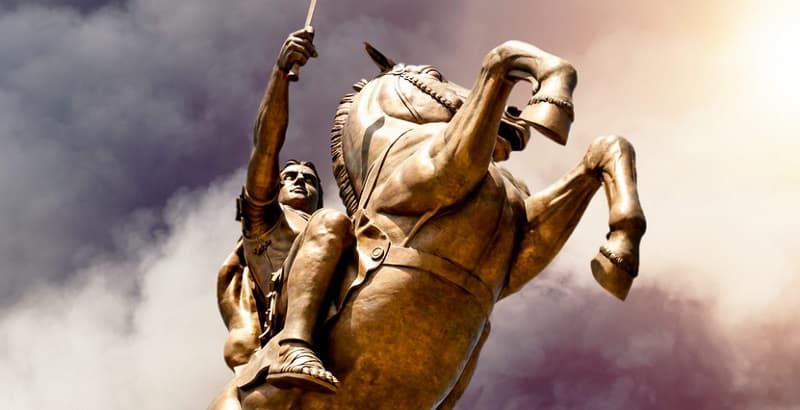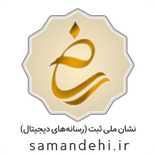Sentence-Summary: Alexander The Great is one of the latest, most updated, and contemporary books on the life of the ancient, Macedonian king, who would extend his empire from a little slide of land in Greece through Persia, Egypt, all the way to India, forming the greatest empire the ancient world had ever seen.
خلاصه کتاب اسکندر بزرگ در یک جمله: اسکندر مقدونی یکی از جدیدترین، بهروزترین و معاصرترین کتابها در مورد زندگی پادشاه مقدونی باستانی است که امپراتوری خود را از زمین کوچکی در یونان تا ایران، مصر و کلی مسیر تا هندوستان گسترش داد تا بزرگترین امپراتوری که جهان باستان تا به حال دیده است را تشکیل دهد.
Favorite quote from the author:
This is a book about a great man, so let’s start with some big words:
“Through every generation of the human race there has been a constant war, a war with fear. Those who have the courage to conquer it are made free and those who are conquered by it are made to suffer until they have the courage to defeat it, or death takes them.”
نقل قولی از نویسنده:
این کتاب در مورد یک مرد بزرگ است، پس اجازه دهید با چند کلمه بزرگ شروع کنیم:
«در طول هر نسلی از بشریت، یک جنگ دائمی وجود داشته است؛ جنگی همراه با ترس و وحشت. کسانی که شجاعت پیروزی در آن را دارند آزاد میشوند و کسانی که توسط جنگ مغلوب میشوند تا زمانی که شجاعت شکست آن را داشته باشند یا مرگ آنها را در بر بگیرد، رنج میکشند.
I can’t think of an example of someone who put a harness on their fears and rode them right into victory more often than Alexander The Great. Especially if we’re talking about existential fears, like those about dying.
من نمیتوانم نمونهای بهتر از اسکندر مقدونی بیندیشم که ترسهای خود را مهار کرده و آنها را مستقیماً به پیروزی رسانده باشد. به خصوص اگر داریم در مورد ترسهای وجودی صحبت میکنیم، مانند ترس از مردن.
Back in the 4th century BC, Alexander built the biggest empire in the world at the time. The Macedonian empire was larger than the Roman empire at the height of its history and the only empire that had been bigger before was the Persian one (which he conquered).
در قرن چهارم قبل از میلاد، اسکندر بزرگترین امپراتوری جهان را در آن زمان ساخت. امپراتوری مقدونی بزرگتر از امپراتوری روم در اوج تاریخ خود بود و تنها امپراتوری که قبلاً بزرگتر از آن بود، امپراتوری پارس نام داشت (که آن را فتح کرد).
From Philip Freeman’s biography, I think there are a few things to learn about this man:
- Bundle your energy.
- Always do the unexpected.
- Without Alexander the Great, Christianity wouldn’t exist.
Ready to learn from the life of an emperor? Let’s dig into history!
از زندگی نامه فیلیپ فریمن، فکر میکنم چند نکته برای یادگیری از این مرد وجود دارد:
- انرژی خود را تقسیم کنید.
- همیشه غیر قابل پیشبینی عمل کنید.
- بدون اسکندر مقدونی، مسیحیت وجود نداشت.
آمادهاید از زندگی یک امپراتور درس بگیرید؟ بیایید به عمق تاریخ برویم!
Lesson 1: Always bundle your energy and resources to direct them towards one specific thing.
درس 1: همیشه انرژی و منابع خود را جمع کنید تا آنها را به سمت یک چیز (هدف) خاص هدایت کنید.
When Alexander the Great conquered Asia Minor (modern-day Turkey), he strategically bundled all of his resources and armed forces to achieve specific milestones.
زمانی که اسکندر مقدونی آسیای صغیر (ترکیه امروزی) را فتح کرد، به شکلی استراتژیک تمام منابع و نیروهای مسلح خود را برای دستیابی به نقاط مهم و خاص جمع کرد.
A crucial city to take over was Miletus, which was a big base of the Persian navy at the time (334 BC). The city initially surrendered right away, but soon the word spread that the Persian navy was about to strike. While planning their battle, one of Alexander’s generals and advisors, Parmenion, spotted an eagle on one of the Greek ships, taking it as a sign to take the battle to sea (yup, that’s how war strategizing worked back in the day).
میلتوس شهری مهم برای تصرف بود. جایی که پایگاه بزرگ نیروی دریایی ایران در آن زمان (334 قبل از میلاد) در آنجا وجود داشت. شهر در همان ابتدا بلافاصله تسلیم شد، اما به زودی خبر رسید که نیروی دریایی ایران در آستانه حمله است. در حین برنامه ریزی برای نبرد، یکی از ژنرالها و مشاوران اسکندر، پارمنیون، عقابی را در یکی از کشتیهای یونانی مشاهده کرد و آن را به عنوان نشانهای برای بردن نبرد به دریا در نظر گرفت (بله، این روش استراتژی جنگی است که در آن زمان کار می کرد: به کنایه).
But seeing that the eagle looked towards the land, Alexander told him “no,” having had an insight: by bundling his forces to take the city, he could seize the docks and keep the Persian navy from ever reaching the shore.
اما همان که اسکندر دید عقاب به سمت خشکی نگاه میکند، به پارمنیون گفت «نه»، چون خودش دیدگاهی داشت: با جمع کردن نیروهایش برای تصرف شهر، میتوانست اسکلهها را تصرف کند و نیروی دریایی ایران را از رسیدن به ساحل باز دارد.
After the decisive victory, he decided to bundle his resources again by disbanding the Greek navy. He knew they’d never stand a chance against the Persian fleet anyway, and replicating this strategy of not allowing them to dock along the entire Mediterranean coastline was the more focused option.
پس از پیروزی قاطع، او تصمیم گرفت با انحلال نیروی دریایی یونان، منابع خود را دوباره دسته بندی کند. او میدانست که به هر حال آنها هرگز در مقابل ناوگان ایرانی شانسی نخواهند داشت، و تکرار این استراتژی که به آنها اجازه نمیداد در امتداد خط ساحلی مدیترانه پهلو بگیرند، گزینهی متمرکزتری بود.
Lesson 2: Do what people wouldn’t expect you to do.
درس 3: کاری را انجام بده که مردم انتظار آن را ندارند.
Concentrating his resources and efforts in small, but tactically important places would often lead Alexander the Great to go against what conventional wisdom of war would have him do, like leading his troops across high mountains in harsh winters or sneaking a few dancers into a city, who would then proceed to kill the soldiers they danced for at night.
متمرکز کردن منابع و تلاشهای خود در مکانهای کوچک، اما از نظر تاکتیکی مهم، اغلب اسکندر مقدونی را به مخالفت با آنچه که علم متعارف جنگی از او میخواهد انجام دهد، سوق میداد. مانند هدایت سربازانش در میان کوههای بلند در زمستانهای طاقت فرسا یا فرستادن چند رقصنده به شکل مخفیانه به داخل شهر که سپس به کشتن سربازانی که شبانه برای آنها میرقصیدند، میانجامید.
One of Alexander’s greatest and most worthy adversaries was King Darius III, but after his victory over Persia by taking Persepolis, the capital, a traitor named Bessus killed the former king of Persia, which spurred Alexander into a mad chase.
یکی از بزرگترین و شایستهترین دشمنان اسکندر، داریوش سوم بود، اما پس از پیروزی او بر ایران و تصرف تخت جمشید که پایتخت بود، خائنی به نام بسوس پادشاه سابق ایران که اسکندر را به تعقیب دیوانهوار او سوق میداد، به قتل رساند.
Expecting to go home after their biggest feat, the Greek army wasn’t thrilled at the idea of chasing one guy all the way to India, but since continuing their quest was such an unexpected turn of events, Alexander managed to rally his troops with an inspiring speech.
ارتش یونان که انتظار داشتند پس از بزرگترین فتح خود به خانه بروند، از ایده تعقیب یک مرد (داریوش سوم) تا هند استقبال نکردند، اما از آنجایی که ادامه ماجراجویی (کشورگشایی) آنها یک اتفاق غیرمنتظره بود، اسکندر موفق شد با یک سخنرانی الهام بخش دوباره نیروهای خود را جمع کند.
Bessus hid behind the Hindu Kush mountains in modern-day Afghanistan, which are part of the Himalaya and average 15,000 feet in hight. He surely didn’t expect Alexander to be crazy enough to try and cross them in the midst of winter, so he didn’t leave behind any troops to guard the pass. But after five long days, they started their descent and by the summer, they had caught up with a very (unhappily) surprised Bessus.
بسوس در پشت کوههای هندوکش در افغانستان امروزی پنهان شد که بخشی از رشته کوه هیمالیا است و به طور میانگین 15000 فوت ارتفاع دارد. او مطمئناً انتظار نداشت که اسکندر آنقدر دیوانه باشد که بتواند در میانه زمستان از میان کوهستان عبور کند، بنابراین هیچ سربازی را برای محافظت از گذرگاه پشت سر نگذاشت. اما پس از پنج روز طولانی، آنها سرعت خود را کم کردند و در تابستان با یک اتفاق غافلگیر کننده از سوی بسوس، گرفتار شدند.
Often getting what you want is simply a matter of doing the opposite of what people expect.
اغلب به دست آوردن آنچه میخواهید، صرفاً به این معناست که برخلاف آنچه مردم انتظار دارند، عمل کنید.
Lesson 3: Had it not been for Alexander’s empire, Christianity wouldn’t have had an audience to start with.
درس 3: اگر امپراتوری اسکندر نبود، مسیحیت مخاطبی برای شروع نداشت.
At 32 years old, Alexander the Great died very young. Imagine what he might’ve built had he lived to be 50! Nevertheless, his legacy would extend far beyond himself. Having touched three continents with his empire, Alexander changed the history of Greece, Persia (Iran), Egypt, Afghanistan, Pakistan, India as well as of all world religions, such as Christianity, Judaism, Buddhism and Islam.
اسکندر مقدونی در 32 سالگی در حالی که بسیار جوان بود، درگذشت. تصور کنید اگر 50 سال عمر میکرد چه امپراتوری میساخت! با این وجود، میراث او بسیار فراتر از خودش خواهد بود. اسکندر پس از لمس سه قاره با امپراتوری خود، تاریخ یونان، پرشیا (ایران)، مصر، افغانستان، پاکستان، هند و همچنین تمام ادیان جهان مانند مسیحیت، یهودیت، بودیسم و اسلام را تغییر داد.
For example, human Buddha statues take the Greek god of the sun, Apollo, as a role model and Alexander is mentioned in the Koran, because his Greek philosophy influenced the Islamic age.
به عنوان مثال، مجسمههای انسانی بودا، خدای یونانی خورشید، آپولو، را الگوی خود قرار میدهند و همینطور نام اسکندر در قرآن ذکر شده است، زیرا فلسفه یونانی او بر عصر اسلامی تاثیر گذاشته است.
But the biggest impact was left on a place he never set foot in: Rome. Greek was the language of intellectuals in the Roman empire, and their architecture and art heavily influenced what the Romans built.
اما بیشترین تاثیر را جایی گذاشت که هرگز پایش را هم در آن نگذاشته بود: رم. یونانی زبان روشنفکران در امپراتوری روم بود و معماری و هنر آنها به شدت بر آنچه رومیان ساختند تاثیر گذاشت.
Even more importantly though, when Christians and Jews first started to break away from the Roman empire, they used Greek to replicate their texts – and it was only because Greek was the predominant language in all of the Mediterranean countries that Christianity had a ready, receptive audience to talk to!
مهمتر از همه، هنگامی که مسیحیان و یهودیان برای اولین بار شروع به جدا شدن از امپراتوری روم کردند، از زبان یونانی برای تکرار متون خود استفاده کردند - و آن هم فقط به این دلیل بود که یونانی زبان غالب در تمام کشورهای مدیترانه بود و مسیحیت یک زبان آماده و پذیرا برای صحبت با مخاطبان خود داشت.
It’s funny how often one thing causes the other in ways we’d never have expected – but then again, doing the unexpected is what it’s all about.
این که هر چند وقت یکبار یک چیز باعث ایجاد چیز دیگر میشود که ما هرگز انتظارش را هم نداشتیم خنده دار است - اما باز هم موضوع کلی همان انجام کارهای غیرمنتظره است.
Alexander The Great Review
مرور کتاب اسکندر کبیر
Why didn’t we cover that extensively in history class? Seriously, I feel like they left out the best stuff. Alexander The Great is definitely a part of history that belongs into every educated person’s brain, no debate here.
چرا ما آن را به طور گسترده در کلاس تاریخ پوشش ندادیم؟ به طور جدی، من احساس میکنم آنها بهترین چیزها از دروس مدرسه را کنار گذاشتهاند. اسکندر مقدونی قطعا بخشی از تاریخ است که به مغز هر فرد تحصیل کرده تعلق دارد و جای هیچ هم بحثی وجود ندارد.





